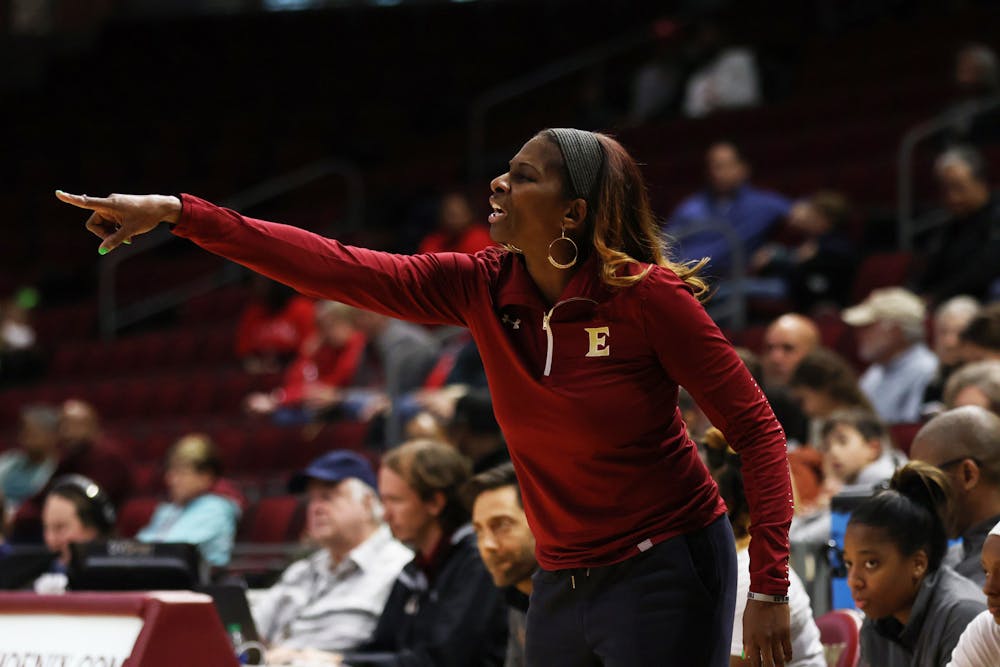Facing opponents on the basketball court has never been a challenge for Elon women’s basketball head coach Charlotte Smith. Her main obstacle, however, has been overcoming years of hatred and racism she faced while growing up as an African American woman.
Smith has been coaching the Phoenix for 11 seasons. The team will be spending February remembering, honoring and celebrating Black History Month. Smith said it’s important that the women on her team are educated and informed about influential African Americans throughout history.
“It’s important to celebrate because when I think back to my time in high school … when you learned about American history, most of everything that you learned about Black history was slavery,” Smith said. “But our identity extends far beyond slavery, and the contributions that we have made to this country extend far beyond slavery.”
Smith, the winningest head women’s basketball coach in program history, has also had a stellar professional playing career. Playing for the University of North Carolina at Chapel Hill, Smith became one of the most decorated athletes in its program history, having her jersey number — 23 — retired. She was also selected as the 33rd overall pick in the 1999 WNBA draft, playing professionally until 2006.
But Smith’s career has not always come easy. Throughout her professional and personal life, she has experienced forms of racism and hatred from those around her.
“Unfortunately racism does exist in our country, and it exists both ways honestly. For myself, the first time I experienced racism was when I was called the N-word,” Smith said. “You have to be strong in your identity and know that who you are is not what people call you but is what you answer to.”
Smith said that overcoming hatred, although a difficult feat, is extremely important to living a successful and positive life.
“The fortunate part for me is that I was raised in a family where everybody was a human being at the end of the day,” Smith said. “So I was taught just to embrace and love everybody. From an ugly moment, you have to turn it into something beautiful so you continue to be a light in the earth.”
Senior forward Maya Johnson said she has experienced similar struggles throughout her life. Like Smith, she spends every day trying to overcome them.
“I really do have a hard time because my brothers are Black, so every day I’m just worried about them,” Johnson said. “That’s not really something you want to be worried about as a sister, but it’s real life.”
The Phoenix will be celebrating and learning about different African Americans and their integral role in history throughout the month.
“We have them do research on people that they feel like have been influential in terms of Black history. We study those people, and we share about those people amongst each other,” Smith said. “It’s important to realize that Black history is American history and for them to learn about the contributions that we have made to this country to make it the great country that it is.”
Johnson said she is looking forward to learning about different people and their impacts with her teammates.
“In Black History Month we learn a lot, we learn about things we don’t know,” Johnson said. “We try to share a fact pretty much every day in practice during February.”
Smith said she is grateful to the university and the program for allowing her to overcome her past obstacles. When she first came to the university, Smith said she had shared her experiences with racism with former university President Emeritus Leo Lambert, who immediately wanted to help her.
“I love the bond that we have here at Elon. It’s a family, and we care about each other’s well being,” Smith said. “So that’s how I got through that is through my Elon family, through people who don’t look like me.”
Johnson said the most important message of Black History Month is the unification of all people, but everyone needs to remember who came before them and how they accomplished it.
“It just reminds us that, yes, we are unified now, but we can’t forget what we went through and who sacrificed to get us where we are today,” Johnson said.


